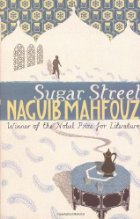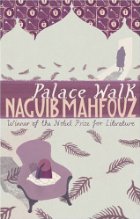
After having explored the angst of patriarchy and that of unrequited love, Naguib Mahfouz's Cairo Trilogy, in its third volume Sugar Street, moves on to the angst of the existential. No one is happy and no one is wise in the al Jawad and Shawkat families as the economic depression of the late 1930s leads into the Second World War; Egypt has modernized, yet in many ways the revolution has stalled. The characters may no longer be under the strict tyrannical thumb of the family patriarch or the British colonizer, but neither do they have a clear sense of direction themselves. Their lives trickle away as their former oppressors linger on, becoming ever more decrepit and obsolete.
Unfortunately, no matter what kind of angst Mahfouz grants to the al Jawad family, I remain less than enthralled. The angst of patriarchy, explored in Palace Walk, was the most engaging for me personally (possibly because the most foreign to my own experience, possibly because most vividly evoked), but with the focus on Kamal's lovesickness in Palace of Desire and his endless existential indecisiveness in Sugar Street, I couldn't help losing patience. Where, in the Cairo Trilogy, is the insight and depth one would expect of a 1000+ page work? Where is the stylistic accomplishment? I just don't see it.
Which is unfortunate, because there is so much here that holds the potential for a great read: the modernization of a country over time; the interplay of the political and the personal in a time of revolution; the changing gender dynamics of twentieth-century Egypt; the politicization/radicalization of Islam in the 1930s and 40s. And indeed we do glimpse all these themes throughout Mahfouz's trilogy, but in a way that never ceases to seem, in my mind, somehow introductory or superficial. Mahfouz's love of introductions can't be denied: in Palace Walk, the first 200 pages consist almost entirely of character introductions, in which the author tells us all about the players' various physical and moral characteristics rather than demonstrating them through action. Even when action finally arrives, it is sufficiently episodic (especially in the later books) that one feels one is essentially being presented with a sketch of a potential narrative, rather than ever feeling what said action might be like in the moment. It's almost as if someone is telling you about a novel, rather than reading the actual novel itself. Mahfouz re-introduces all the characters at the beginning of the two subsequent books, and by the time he reaches Sugar Street the action is SO episodic that months and even years may pass between chapters, necessitating the repetition of all those physical and emotional descriptions all over again at frequent intervals throughout the novel.
On the other hand, the few times I truly felt immersed in a character's mental or emotional landscape, I perversely wished myself away again. Kamal's endless indecision about whether or not to get married, for example—I'm sure that Mahfouz is attempting to make some kind of Henry James-style statement about how Kamal's preoccupation with philosophy and his overly analytical nature are trapping him into a life of non-action, but Sugar Street is no Beast in the Jungle1: rather than plumbing the depths of Kamal's psyche or confronting the reader with the ruins of his wasted life, Kamal's sections here resemble more the experience of hanging out repeatedly with an extremely whiny friend who delivers the same self-pitying diatribe every time one takes him out for a beer. Not only that, but Mahfouz's style (or the style of William Maynard Hutchins's translation) fails to add much humor or aesthetic pleasure to the characters' neuroses:
Kamal went around in circles while the whole world advanced. He kept asking himself, "Are you going to get married or not?" Life seemed to offer nothing but gloomy confusion. His opportunity was neither ideal nor worthless. Love was difficult. It was characterized by controversy and suffering. If only she would marry someone else so he could free himself from this confusion and torment.
I mean, I can understand struggling with angst because one's father is a near-schizophrenic tyrant who never stops yelling at one, but come on: "Love was difficult"? Who ever said that it wouldn't be? What a stellar reason for life-long paralysis.
All this venting aside, there were a few interesting aspects to Sugar Street. I appreciated that Yasin, late in life, grew a sense of humor and became prone to saying things like "We're a religious family. Yes, we're dissolute inebriates, but we all plan to repent eventually." I found the storyline concerning al-Jawad grandson Ridwan interesting to the point where I wished he would be given his own novel, full of ambitious young gay Egyptian politicos doing their sexy turncoat thing. Ahmad and Sawsan and their naive yet refreshingly active and companionable life as Communist activists were also intriguing. And I was interested in the tendency, as Egyptian society becomes marginally less oppressive, for nearly all the characters to wax nostalgic about how far things have declined from its former glories: even Amina takes time to reminisce about the good old times when she was confined to the house on pain of eviction. Those were the days! Simultaneously, both Kamal and Yasin chastise themselves for their failure to measure up to their father, who, they imagine, was drinking and whoring from his heart, whereas they're just doing it to kill time:
Jalila's lover had been a passionate and impetuous man with a heart untroubled by qualms. What was Kamal compared to that man? Even when he visited the brothel each Thursday, only alcohol could release him from his worries long enough for him to enjoy "love" here.
So there you go, mums and dads: be sure to engage in your brothel-patronage with both buttocks, as Montaigne would say, if you want to win the respect of your offspring. In all seriousness, given that the al-Jawad père we saw as readers hardly possessed the "heart untroubled by qualms" imagined by his son, this passage does comment interestingly on how the compulsive dishonesty of the al-Jawad family leads to false impressions that haunt its members for the rest of their lives. Not interestingly enough, though, for me to mourn the end of Sugar Street and the Cairo Trilogy as a whole.
1That's right, I'm comparing a book to a Henry James novella, and the James is winning out. Those who know my feelings on Henry James will appreciate how uncomplimentary this is. Although the thing is: I can appreciate that James is an accomplished artist, albeit one whose work I don't enjoy. Whereas I honestly don't understand the source of the Nobel Prize Committee's admiration for Mahfouz's art.
Despite my snide comments, thanks are due to Richard for organizing this readalong. You are a sport, friend!



